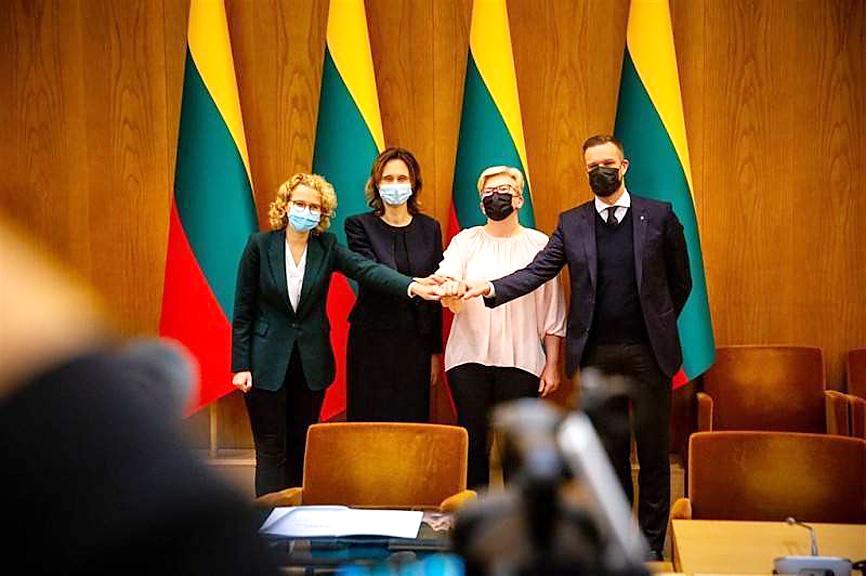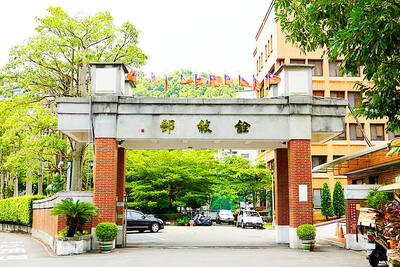Lithuania plans to open a representative office in Taiwan, and leave a Beijing-led alliance with central and eastern European nations, Lithuanian Radio and Television (LRT) quoted a lawmaker as saying on Tuesday.
The Ministry of Foreign Affairs said it welcomes countries willing to establish friendly relations with Taiwan, but added that it has no additional information on the matter.
The Lithunian Committee on Foreign Affairs last month agreed that the Baltic nation should leave China’s 17+1 initiative to bolster cooperation between Beijing and 17 European nations, the LRT report said.

Photo: Screen grab from Facebook
“China has aims to take over strategic infrastructure in various countries... Why should we embroil ourselves in these risks?” Lithuanian Committee on Foreign Affairs Chairman and former diplomat Zygimantas Pavilionis was quoted as saying in the report.
Estonia, Latvia and several other east European nations are thinking of taking similar steps, he said, adding that Lithuania plans to expand relations with Taiwan by opening an economic office in the country.
Lithuanian Minister of Foreign Affairs Gabrielius Landsbergis told LRT that the cooperation program with Beijing has brought Lithuania “almost no benefits.”
“The 17+1 initiative ... is not useful for Europe; it is dividing Europe, because countries have different opinions on China,” he said.
“I am not saying that we are leaving [the alliance] and that it is the end, but we should consider what is a useful way of building a relationship with China,” he added.
Lithuania is not alone in its reluctance to continue working with China, as evidenced by the Chinese and Central and Eastern European virtual summit held on Feb. 9, during which the three Baltic states, along with Bulgaria, Romania and Slovenia, sent ministers instead of their head of state or government.
In April last year, 50 Lithuanian members of parliament, along with more than 200 political and intellectual figures, wrote a joint letter to Lithuanian President Gitanas Nauseda expressing their support for Taiwan to join international organizations and to establish an office in Taiwan.
The move is in line with the promise made by Lithuania’s coalition government in November last year that it would “actively oppose any violation of human rights and democratic freedoms, and will defend those fighting for freedom around the world, from Belarus to Taiwan.”
In Taipei, ministry spokeswoman Joanne Ou (歐江安) yesterday said that Taiwan is open to making friends with nations around the world and welcomes any move that would deepen Taiwan-Lithuania relations.
However, the ministry has no further information regarding Lithuania’s reported plan to establish a representative office in Taiwan, she said.
As for the Baltic nation’s plan to leave the 17+1 platform, the ministry has no comment, she said.

Taiwan Semiconductor Manufacturing Co (TSMC, 台積電) is expected to start construction of its 1.4-nanometer chip manufacturing facilities at the Central Taiwan Science Park (CTSP, 中部科學園區) as early as October, the Chinese-language Liberty Times (the Taipei Times’ sister newspaper) reported yesterday, citing the park administration. TSMC acquired land for the second phase of the park’s expansion in Taichung in June. Large cement, construction and facility engineering companies in central Taiwan have reportedly been receiving bids for TSMC-related projects, the report said. Supply-chain firms estimated that the business opportunities for engineering, equipment and materials supply, and back-end packaging and testing could reach as high as

CHAMPIONS: President Lai congratulated the players’ outstanding performance, cheering them for marking a new milestone in the nation’s baseball history Taiwan on Sunday won their first Little League Baseball World Series (LLBWS) title in 29 years, as Taipei’s Dong Yuan Elementary School defeated a team from Las Vegas 7-0 in the championship game in South Williamsport, Pennsylvania. It was Taiwan’s first championship in the annual tournament since 1996, ending a nearly three-decade drought. “It has been a very long time ... and we finally made it,” Taiwan manager Lai Min-nan (賴敏男) said after the game. Lai said he last managed a Dong Yuan team in at the South Williamsport in 2015, when they were eliminated after four games. “There is

Democratic nations should refrain from attending China’s upcoming large-scale military parade, which Beijing could use to sow discord among democracies, Mainland Affairs Council Deputy Minister Shen You-chung (沈有忠) said. China is scheduled to stage the parade on Wednesday next week to mark the 80th anniversary of Japan’s surrender in World War II. The event is expected to mobilize tens of thousands of participants and prominently showcase China’s military hardware. Speaking at a symposium in Taichung on Thursday, Shen said that Chinese Minister of Foreign Affairs Wang Yi (王毅) recently met with Indian Prime Minister Narendra Modi during a visit to New Delhi.

FINANCES: The KMT plan to halt pension cuts could bankrupt the pension fund years earlier, undermining intergenerational fairness, a Ministry of Civil Service report said The Chinese Nationalist Party (KMT) caucus’ proposal to amend the law to halt pension cuts for civil servants, teachers and military personnel could accelerate the depletion of the Public Service Pension Fund by four to five years, a Ministry of Civil Service report said. Legislative Speaker Han Kuo-yu (韓國瑜) on Aug. 14 said that the Act Governing Civil Servants’ Retirement, Discharge and Pensions (公務人員退休資遣撫卹法) should be amended, adding that changes could begin as soon as after Saturday’s recall and referendum. In a written report to the Legislative Yuan, the ministry said that the fund already faces a severe imbalance between revenue